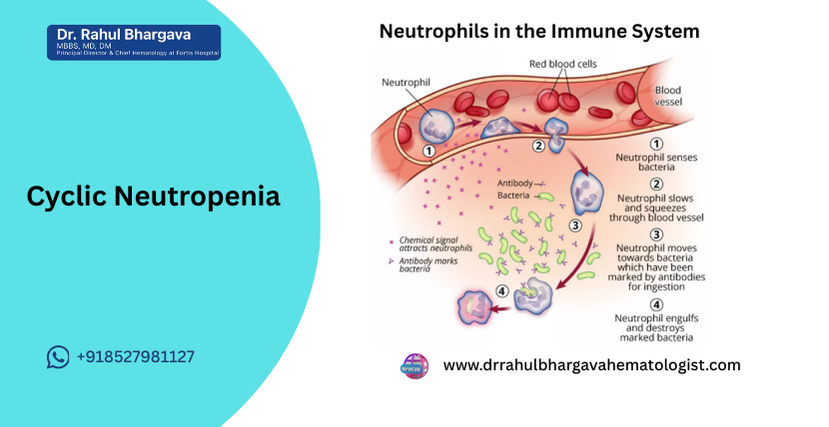Cyclic Neutropenia Treatment in India

Cyclic neutropenia is a rare genetic disorder characterized by recurrent episodes of neutropenia, a condition where the number of neutrophils (a type of white blood cell essential for fighting infections) in the blood is abnormally low. These episodes typically occur at regular intervals, usually every 21 days, lasting for several days, and are followed by periods of normal neutrophil levels. Cyclic neutropenia is caused by mutations in the ELA2 gene, which encodes neutrophil elastase, an enzyme that plays a critical role in the maturation of neutrophils in the bone marrow.
While cyclic neutropenia can result in frequent and severe infections, particularly bacterial infections, the condition's severity and the frequency of neutropenia episodes can vary from person to person.
What is Cyclic Neutropenia?
Cyclic Neutropenia is a rare blood disorder characterized by periodic drops in neutrophils (a type of white blood cell essential for fighting infections). This condition causes individuals to experience recurring episodes of infections, fevers, and general illness. Typically, these cycles occur every 21 days but can vary from person to person.
Dr. Rahul Bhargava, an expert Haematologist, has extensive experience in diagnosing and managing cyclic neutropenia, offering the latest and most effective treatment options in India.
Causes of Cyclic Neutropenia
Cyclic neutropenia is primarily a genetic disorder caused by mutations in the ELANE gene, which controls neutrophil production. The defective gene leads to a reduction in the production of neutrophils, making patients vulnerable to infections during neutropenic episodes. In rare cases, the cause may remain unknown.
Types of Cyclic Neutropenia
While cyclic neutropenia itself is a distinct condition, its severity can vary based on the frequency of neutropenic episodes and the degree of immune system suppression. The disorder is classified based on:
- Mild Cyclic Neutropenia: Less frequent episodes, fewer symptoms.
- Severe Cyclic Neutropenia: More frequent, severe symptoms, higher risk of infection complications.
Symptoms of Cyclic Neutropenia
Patients with cyclic neutropenia often experience recurrent symptoms during neutropenic episodes. Common symptoms include:
- Recurrent fevers and chills
- Frequent mouth ulcers
- Sore throat
- Infections of the skin, respiratory system, or gastrointestinal tract
- Fatigue and general weakness
- Swollen lymph nodes
Diagnosis of Cyclic Neutropenia
Diagnosing cyclic neutropenia requires a combination of clinical evaluation and laboratory tests. Dr. Rahul Bhargava employs advanced diagnostic techniques to ensure accurate detection of this condition.
Treatment for Cyclic Neutropenia
The treatment for cyclic neutropenia focuses on managing symptoms, preventing infections, and boosting neutrophil counts. Dr. Rahul Bhargava offers comprehensive treatment plans, including:
- Granulocyte-Colony Stimulating Factor (G-CSF): This medication helps stimulate neutrophil production and reduce the severity of neutropenic episodes.
- Antibiotics: Preventative antibiotics are prescribed to reduce the risk of infection during neutropenic periods.
- Regular Monitoring: Ongoing blood tests to monitor neutrophil counts and adjust treatment as needed.
- Bone Marrow Transplant: In severe cases, especially when G-CSF is ineffective, a bone marrow or stem cell transplant may be considered as a potential cure.
Cost of Treatment and Stay in India
The cost of treating cyclic neutropenia in India is relatively affordable compared to many Western countries, offering high-quality medical care for patients. The total cost of treatment, including hospital stay, can vary depending on the severity of the condition, the complexity of treatment, and the duration of care.
-
Granulocyte-Colony Stimulating Factor (G-CSF) Treatment (per month):
USD: $500 – $1,500
INR: ₹37,000 – ₹1,10,000 -
Antibiotics (per month):
USD: $50 – $200
INR: ₹3,700 – ₹14,800 -
Bone Marrow Transplant (Stem Cell Transplant):
USD: $20,000 – $40,000
INR: ₹15,00,000 – ₹30,00,000 -
Hospital Stay (per night):
USD: $30 – $200
INR: ₹2,200 – ₹15,000 per night
India provides affordable yet high-quality medical treatment for cyclic neutropenia, making it an ideal destination for international patients seeking effective and cost-efficient care. The overall treatment costs are considerably lower compared to Western countries, without compromising the quality of care provided.
Frequently Asked Questions
With proper treatment and regular monitoring, individuals with cyclic neutropenia can lead a normal life. Regular use of G-CSF significantly improves the condition.
There is no permanent cure for cyclic neutropenia, but it can be effectively managed with medication. Bone marrow transplants may offer a potential cure in severe cases.
Yes, cyclic neutropenia is often inherited in an autosomal dominant pattern, meaning a parent with the condition has a 50% chance of passing it on to their child.